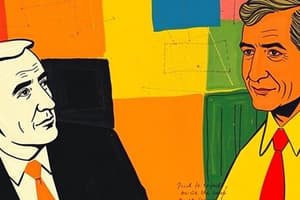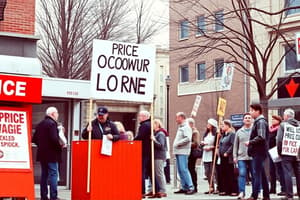Podcast
Questions and Answers
What is the main purpose of raising taxes on alcohol and cigarettes?
What is the main purpose of raising taxes on alcohol and cigarettes?
How does price discrimination benefit businesses?
How does price discrimination benefit businesses?
What is the purpose of imposing tariffs on imported goods?
What is the purpose of imposing tariffs on imported goods?
How do lower taxes on certain goods affect consumption according to the text?
How do lower taxes on certain goods affect consumption according to the text?
Signup and view all the answers
What is the goal of using tax policy on 'sin' goods?
What is the goal of using tax policy on 'sin' goods?
Signup and view all the answers
How can tariffs contribute to inflationary pressures in an economy?
How can tariffs contribute to inflationary pressures in an economy?
Signup and view all the answers
What is the fundamental notion of price control?
What is the fundamental notion of price control?
Signup and view all the answers
How do lower interest rates impact the economy according to the text?
How do lower interest rates impact the economy according to the text?
Signup and view all the answers
What is the primary goal of fiscal policies in relation to price control?
What is the primary goal of fiscal policies in relation to price control?
Signup and view all the answers
Which tool allows central banks to indirectly control prices?
Which tool allows central banks to indirectly control prices?
Signup and view all the answers
According to Keynesian economists, how should fiscal policy be used?
According to Keynesian economists, how should fiscal policy be used?
Signup and view all the answers
What do supply-siders argue about fiscal policy?
What do supply-siders argue about fiscal policy?
Signup and view all the answers
Study Notes
Price Control
One of the oldest debates in economics revolves around price control; it encompasses monetary policy, taxes, price setting, and even regulations. While there are opposing views, the fundamental notion is that price control involves raising or lowering price levels using various strategies. This section focuses on the different aspects of price control from a macroeconomic perspective, including monetary policy, fiscal measures, and tariffs, among others.
Monetary Policy and Price Control
Monetary policy is a crucial tool employed by central banks to control inflation and stabilize the economy. Central banks like the Federal Reserve (in the United States) determine interest rates based on current economic conditions. Lower interest rates encourage borrowing and spending, stimulating economic growth; higher interest rates slow down inflationary pressures and increase savings, curbing economic expansion. This tool allows central banks to indirectly control prices by managing money flow within the economy.
Fiscal Policies and Price Control
Fiscal policies involve changes in government expenditure and taxation aimed at controlling the overall level of aggregate demand. Keynesian economists believe that fiscal policy should be used to stabilize the economy and manage price fluctuations by adjusting demand. On the other hand, supply-siders argue that fiscal policy does not create economic value but rather changes the equilibrium of supply and demand curves.
Tax Policy
Tax policy can be used to control certain prices, such as taxes on alcohol or cigarettes, which are considered "sin" goods. By raising the price of these goods, governments aim to discourage consumption and reduce related health issues. Lower taxes, conversely, can lead to increased consumption and potentially higher prices due to increased demand.
Price Discrimination
Price discrimination occurs when a business charges different customers different prices for the same goods or services. It can occur in various forms, such as when airlines charge different prices for the same flight to different passengers. The goal is to increase overall revenue by exploiting customers' varying willingness to pay.
Tariffs
Tariffs are taxes imposed on imported goods. By raising the cost of imported goods, tariffs increase their prices relative to domestically produced goods, potentially reducing demand and stabilizing domestic prices. However, tariffs can also increase overall prices by raising the cost of goods, leading to inflationary pressures.
Conclusion
Price control is a multidimensional concept that encompasses various economic policies aimed at managing price levels in an economy. Monetary policy, fiscal measures, taxation, price discrimination, and tariffs are all tools that can be employed to control prices. The use of these tools must be carefully balanced to minimize potential negative impacts on the economy while ensuring stable prices and overall economic well-being.
Studying That Suits You
Use AI to generate personalized quizzes and flashcards to suit your learning preferences.
Description
Explore the intricacies of price control in economics through discussions on monetary policy, fiscal measures, tax policies, price discrimination, and tariffs. Learn how these tools are utilized to manage price levels and stabilize the economy.



